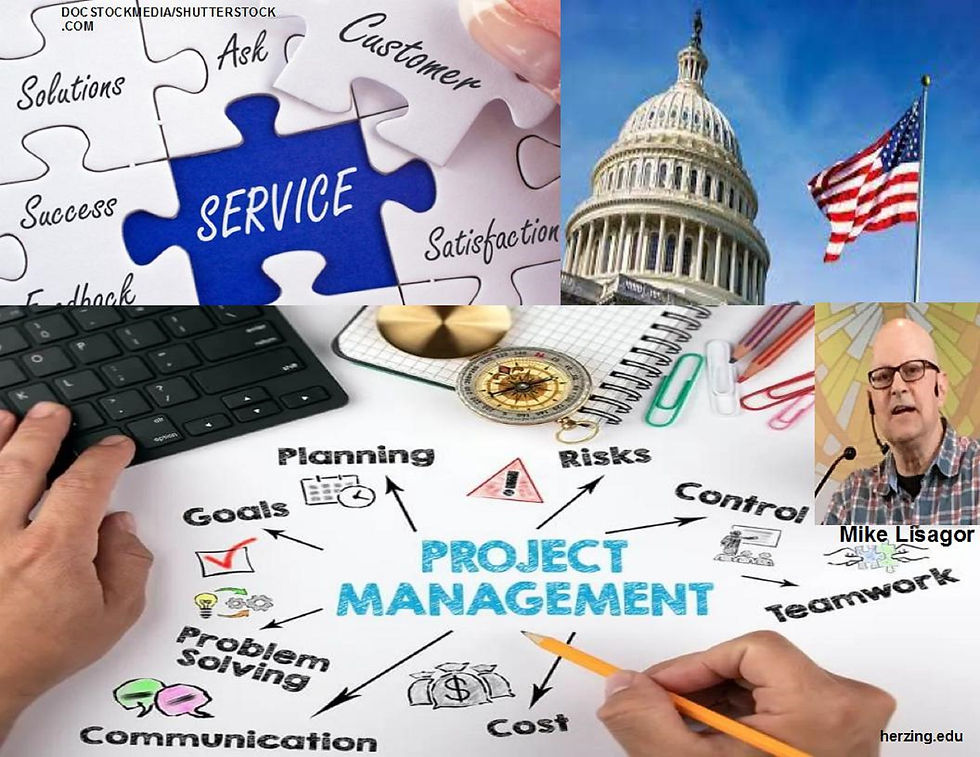8 Client Satisfaction Guidelines Every Government Project Manager Should Know
- Ken Larson

- Feb 21, 2023
- 3 min read

“WASHINGTON TECHNOLOGY” By Mike Lisagor
“It’s impossible to overstate the importance of relationships to the successful management of a project. A few valuable lessons from my book,The Essential Guide to Managing a Government Project.“
____________________________________________________________________________
“1. Stakeholders. It’s critical that you identify the key project decision makers or influencers. These individuals aren’t always readily apparent. For instance, many information technology projects are actually funded by a client’s operational unit whose buy-in is needed both in the requirements phase and to obtain delivery acceptance. In addition, internal company support organizations play a critical role in ensuring project success. Your efforts to effectively communicate with them in a timely and responsive manner will pay huge dividends.
2. Manage Scope Creep. Almost all of contracts have a defined scope of work. Too often, Project Managers, sometimes with pressure from sales or because they are strong people pleasers, try to deliver everything their client wants regardless of the impact on cost and schedule. This is why it’s important to make sure that you and your client have a clear understanding and agreement regarding what is in and out of scope. This, clearly, is one of the biggest government contractor challenges.
3. Get it in Writing. It’s tempting to agree with your client counterpart when asked to add an additional feature, do a little more work for free, skip a documentation standard, etc. If it’s important enough for you to do, it’s important enough to get in writing. Too many project managers, myself included, have learned this the hard way. So, beware of any verbal direction that impacts your contract.
4. Just Say No. Be willing to say no when something the client wants is out of scope. Of course, I realize that this is often a very difficult thing to do. When something is not in the client’s best interest, you can say, “Our experience has shown us that…” When you must say no, try to offer a more attractive alternative to solve the client’s problem. When all else fails…talk to your manager! Don’t just put your head down and ignore the problem. The longer you wait, the worse things will get.
5. Share Bad News. No client likes to be surprised with bad news. A key component of maintaining a good customer relationship is to identify and communicate potential project risks to your client before they become more serious issues. In other words, don’t wait until the day before a deliverable is due to tell your client you are going to miss the deadline. Instead, bring them a solution along with the problem in advance. Of course, this implies establishing a no blame type of company culture that encourages project staff to report accurate progress status.
6. Listen. Actively seek client feedback regarding what is going well and not well. Also, listen to your industry teammates regarding project status and concerns. You can’t fix it if you don’t know about it.
7. Avoid Personal Services. While personal services are against the federal regulations, I’m still aware that some contractors function in this manner. So, try to establish a collaborative “Stephen Covey-like” win-win partnership with your clients. Help them understand that your company is a services and solutions delivery business as opposed to a personal services company. Help your client focus on contract deliverables and milestones instead of the provision of warm bodies who run errands.
8. Be Ethical. Every employee is expected to behave in an ethical manner. There is absolutely no exception to this. If in doubt, seek guidance. If you are uncertain about your client’s business practices, talk to your contracts administrator or upper management.
I once had another company’s disgruntled employee hand me their strategy document for their contract recompete that we were going to bid on. Seeing the cover page title, I immediately put it in an envelope and our contracts manager gave it to that company with assurance that we hadn’t looked at it. Someone else might have taken advantage of this situation but I knew it was unethical. And we still won the contract!”
ABOUT Mike Lisagor
“A (usually) retired but still writer and blues musician, Mike Lisagor is the founder of Celerity Works and a co-founder of GovFlex.com. His other books include How to Develop a Winning SBIR Proposal (with Eric Adolphe), How to Win in the Government Market (with Mark Amtower), and Personal Growth During the Time of COVID. He can be reached at mike@celerityworks.com.“




Comments